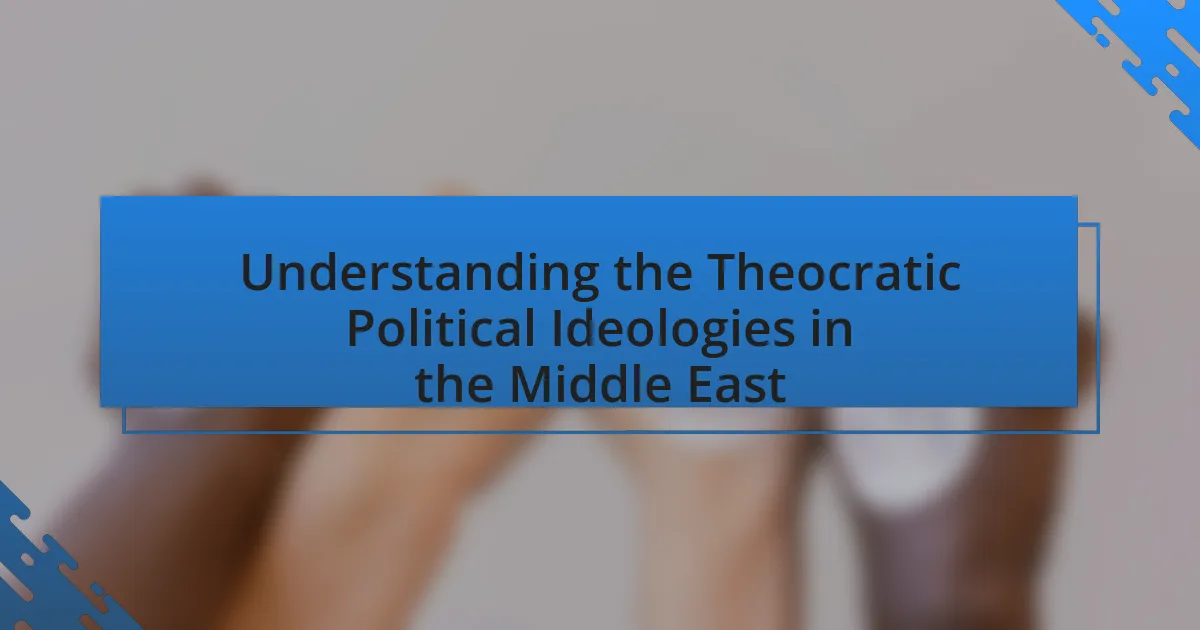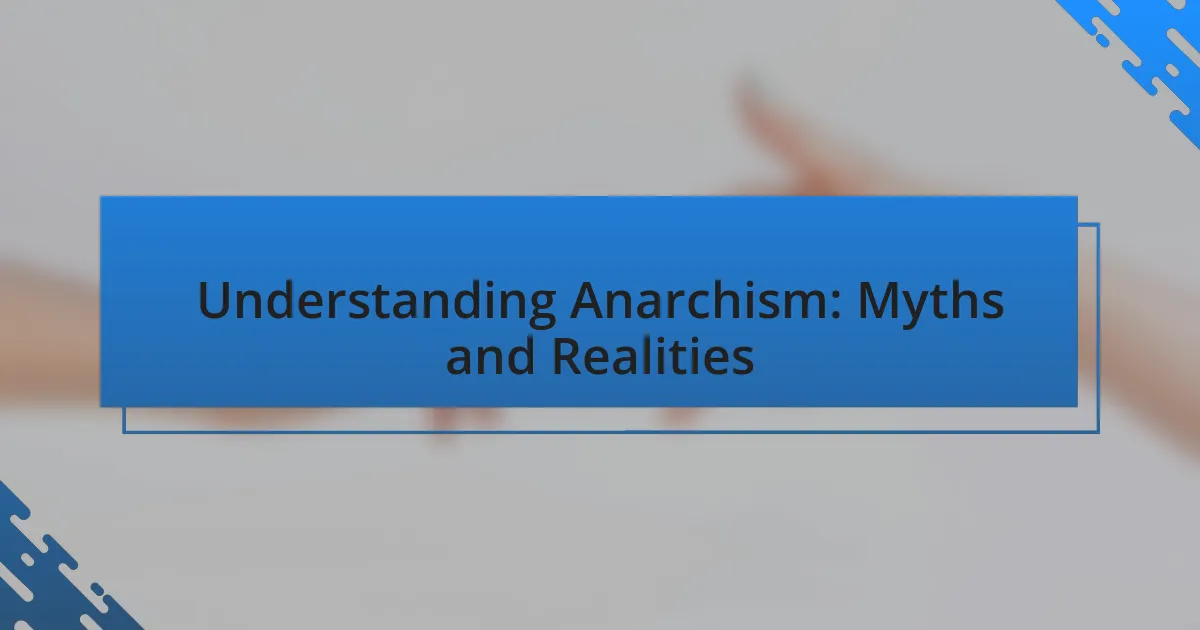The article titled “The Ethics of Political Ideologies: A Philosophical Perspective” examines the key ethical considerations that underpin various political ideologies, including justice, equality, freedom, and the common good. It explores how different ideologies, such as liberalism, conservatism, and socialism, define ethics based on their foundational principles and historical contexts. The article highlights the role of morality in shaping political thought and decision-making, the implications of ethical analysis on public policy, and the challenges posed by conflicting ethical views in governance. Additionally, it discusses the importance of education and critical evaluation in understanding the ethical dimensions of political ideologies.
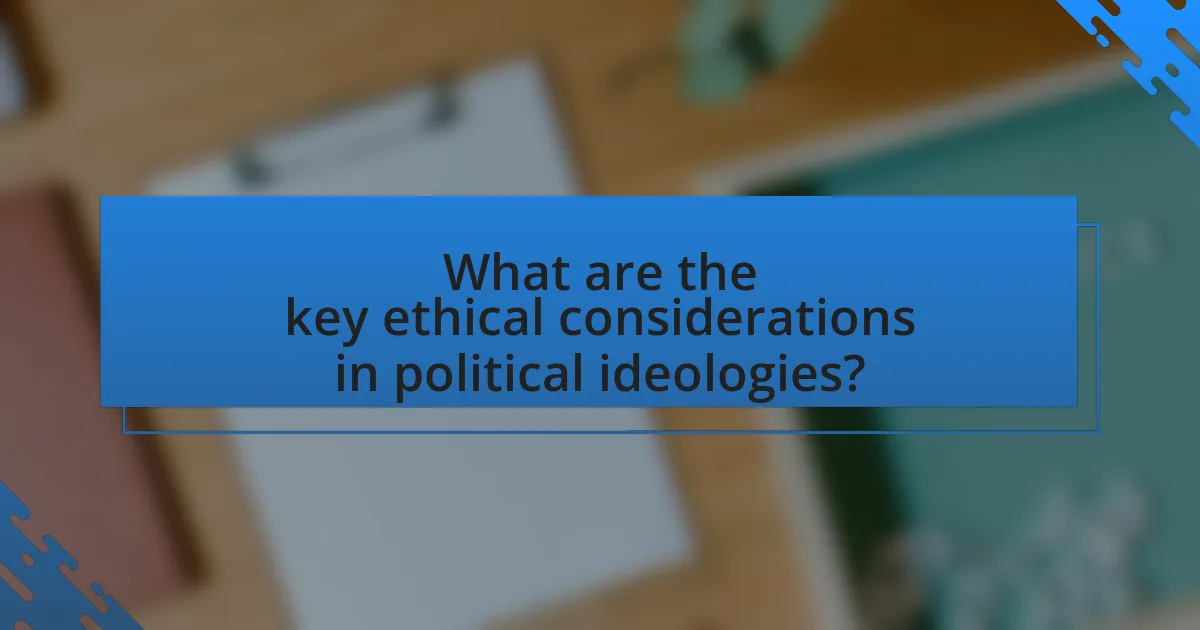
What are the key ethical considerations in political ideologies?
Key ethical considerations in political ideologies include justice, equality, freedom, and the common good. Justice pertains to the fair distribution of resources and opportunities, as seen in theories like Rawls’ Theory of Justice, which emphasizes fairness as a fundamental principle. Equality addresses the moral imperative to treat individuals with equal respect and consideration, often highlighted in democratic ideologies that advocate for equal rights. Freedom involves the balance between individual liberties and societal constraints, a central theme in liberal ideologies that prioritize personal autonomy. Lastly, the common good reflects the ethical obligation to promote societal welfare, a principle rooted in communitarianism, which argues that individual interests should align with community well-being. These considerations shape the moral frameworks within which political ideologies operate, influencing policy decisions and societal norms.
How do different political ideologies define ethics?
Different political ideologies define ethics based on their foundational principles and values. For example, liberalism emphasizes individual rights and freedoms, viewing ethics as a framework that promotes personal autonomy and social justice. In contrast, conservatism prioritizes tradition and social order, defining ethics through the lens of maintaining established norms and values. Socialism focuses on collective welfare and equality, framing ethics around the redistribution of resources to achieve social justice. Each ideology’s ethical perspective is shaped by its historical context and philosophical underpinnings, such as utilitarianism in liberalism, virtue ethics in conservatism, and Marxist ethics in socialism. These definitions illustrate how ethics is not universally agreed upon but is instead influenced by the ideological lens through which it is viewed.
What role does morality play in liberalism?
Morality plays a foundational role in liberalism by emphasizing individual rights and ethical principles that promote personal freedom and social justice. In liberal thought, moral considerations guide the establishment of laws and policies that protect individual autonomy while ensuring equality and fairness in society. For instance, John Stuart Mill’s “On Liberty” argues that moral principles should safeguard individual freedoms against societal tyranny, illustrating how morality underpins liberal values. This ethical framework is essential for fostering a just society where individuals can pursue their own happiness without infringing on the rights of others.
How do conservatism and ethics intersect?
Conservatism and ethics intersect primarily through the emphasis on tradition, social stability, and moral values. Conservatives advocate for preserving established norms and practices, which they believe provide a moral framework for society. This perspective is rooted in the idea that ethical behavior is often derived from historical precedents and cultural heritage, as seen in the works of philosophers like Edmund Burke, who argued that societal change should be gradual and respect the wisdom of past generations. Furthermore, conservative ethics often prioritize community and familial bonds, suggesting that moral responsibilities extend beyond individualism to include obligations to one’s community and society at large. This intersection highlights the belief that ethical principles are not only personal but also collective, shaped by the values and traditions that have stood the test of time.
What ethical principles are central to socialism?
The ethical principles central to socialism include social justice, equality, and collective ownership. Social justice emphasizes the fair distribution of resources and opportunities, aiming to reduce inequality within society. Equality is a fundamental tenet, advocating for equal rights and access to services for all individuals, regardless of their socioeconomic status. Collective ownership promotes the idea that resources and means of production should be owned and managed by the community or the state, rather than by private individuals, to ensure that wealth is shared and benefits all members of society. These principles are rooted in the belief that a more equitable society leads to greater overall well-being and social cohesion.
Why is it important to analyze the ethics of political ideologies?
Analyzing the ethics of political ideologies is crucial because it helps to understand the moral implications and consequences of various political beliefs and practices. Ethical analysis reveals how ideologies influence governance, social justice, and individual rights, thereby shaping societal norms and behaviors. For instance, examining the ethical foundations of liberalism can highlight its commitment to individual freedoms and equality, while scrutinizing authoritarian ideologies can expose potential human rights violations. This understanding is essential for fostering informed civic engagement and promoting accountability in political systems.
How can ethical analysis influence political decision-making?
Ethical analysis can significantly influence political decision-making by providing a framework for evaluating the moral implications of policies and actions. This framework helps policymakers assess the consequences of their decisions on various stakeholders, ensuring that actions align with societal values and ethical standards. For instance, ethical analysis can guide decisions on healthcare policies by weighing the benefits of universal access against budget constraints, ultimately promoting fairness and equity. Historical examples, such as the civil rights movement, illustrate how ethical considerations can drive legislative changes, as leaders prioritized justice and equality over political expediency. Thus, ethical analysis serves as a critical tool in shaping policies that reflect the moral compass of society.
What are the consequences of ignoring ethics in politics?
Ignoring ethics in politics leads to corruption, erosion of public trust, and the undermining of democratic institutions. When political leaders prioritize personal gain over ethical considerations, it results in practices such as bribery, nepotism, and manipulation of laws, which can destabilize governance. Historical examples, such as the Watergate scandal in the United States, illustrate how unethical political behavior can lead to significant political fallout, including loss of office and public disillusionment. Furthermore, a lack of ethical standards can foster environments where human rights abuses occur, as seen in authoritarian regimes that disregard moral principles for power consolidation. Thus, the consequences of neglecting ethics in politics are profound, impacting both governance and societal well-being.
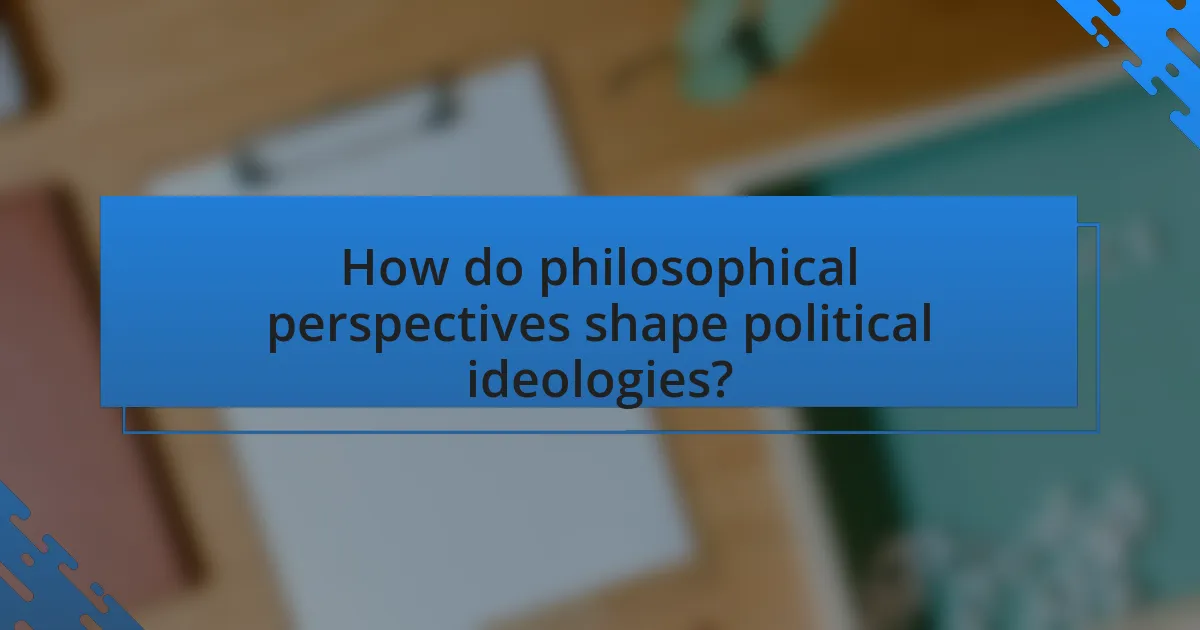
How do philosophical perspectives shape political ideologies?
Philosophical perspectives shape political ideologies by providing foundational principles that influence beliefs about governance, justice, and individual rights. For instance, utilitarianism, which prioritizes the greatest good for the greatest number, informs policies that aim for collective welfare, while Kantian ethics emphasizes duty and moral law, leading to ideologies that focus on individual rights and justice. Historical examples include the Enlightenment thinkers, such as John Locke, whose ideas on natural rights and government by consent directly influenced liberal democratic ideologies, and Karl Marx, whose critique of capitalism and advocacy for class struggle shaped socialist and communist movements. These philosophical frameworks guide the interpretation of political issues, the formulation of policies, and the justification of state actions, demonstrating their critical role in the development and evolution of political ideologies.
What are the major philosophical theories influencing political thought?
The major philosophical theories influencing political thought include liberalism, conservatism, socialism, and utilitarianism. Liberalism emphasizes individual rights and freedoms, advocating for democracy and free markets, as seen in the works of John Locke and John Stuart Mill. Conservatism focuses on tradition, social stability, and maintaining established institutions, as articulated by thinkers like Edmund Burke. Socialism critiques capitalism and promotes social ownership and egalitarianism, with Karl Marx being a pivotal figure in its development. Utilitarianism, primarily associated with Jeremy Bentham and John Stuart Mill, evaluates political actions based on their consequences for overall happiness and welfare. These theories have shaped political ideologies and practices throughout history, influencing governance and societal structures globally.
How does utilitarianism inform political ideologies?
Utilitarianism informs political ideologies by prioritizing the greatest good for the greatest number, shaping policies and governance based on outcomes that maximize overall happiness. This ethical framework influences various political movements, such as liberalism and social democracy, which advocate for policies aimed at enhancing collective welfare through social programs and economic reforms. Historical examples include the implementation of welfare states in the mid-20th century, where governments adopted utilitarian principles to justify social safety nets aimed at reducing poverty and inequality, thereby increasing societal well-being.
What impact does Kantian ethics have on political philosophy?
Kantian ethics significantly influences political philosophy by emphasizing the principles of autonomy, moral duty, and universalizability. This ethical framework asserts that individuals should be treated as ends in themselves, which informs concepts of human rights and justice in political discourse. For instance, Kant’s categorical imperative advocates for actions that can be universally applied, shaping democratic ideals and legal systems that prioritize individual rights and equality. The impact is evident in modern political theories that advocate for moral imperatives in governance, such as those seen in liberalism and social contract theories, which draw from Kant’s emphasis on rationality and ethical considerations in political decision-making.
In what ways do philosophical debates affect political practices?
Philosophical debates significantly influence political practices by shaping the foundational beliefs and values that guide policy-making and governance. For instance, discussions around justice, rights, and the role of the state inform legislative frameworks and political ideologies. The Enlightenment thinkers, such as John Locke and Jean-Jacques Rousseau, argued for individual rights and social contracts, which laid the groundwork for modern democratic systems. These philosophical principles directly impact contemporary political practices, such as the emphasis on human rights in international law and the establishment of democratic institutions. Furthermore, ongoing debates about ethics in politics, such as utilitarianism versus deontological ethics, continue to affect decision-making processes and public policy, illustrating the enduring relevance of philosophical discourse in shaping political realities.
How do philosophical disagreements lead to ideological conflicts?
Philosophical disagreements lead to ideological conflicts by creating divergent worldviews that influence beliefs and values. When individuals or groups hold fundamentally different philosophical principles, such as differing views on morality, justice, or human nature, these differences can manifest in conflicting ideologies. For instance, the Enlightenment period showcased how varying interpretations of reason and individual rights led to the emergence of liberalism versus conservatism, resulting in significant political strife. Historical examples, such as the ideological battles during the French Revolution, illustrate how philosophical divides can escalate into broader societal conflicts, as competing ideologies vie for dominance and legitimacy.
What role does ethical relativism play in political discourse?
Ethical relativism plays a significant role in political discourse by promoting the idea that moral standards are not universal but rather culturally bound. This perspective allows for diverse viewpoints in political discussions, as it acknowledges that different societies may have varying beliefs about right and wrong. For instance, ethical relativism can lead to more inclusive policymaking by encouraging dialogue among groups with differing moral frameworks, thereby fostering understanding and cooperation. Additionally, it challenges the imposition of one culture’s values over another, which can be seen in debates over human rights where cultural practices may conflict with universal norms. This approach is supported by anthropological studies that highlight the variability of moral codes across cultures, demonstrating that ethical relativism is a crucial lens through which political ideologies can be examined and understood.
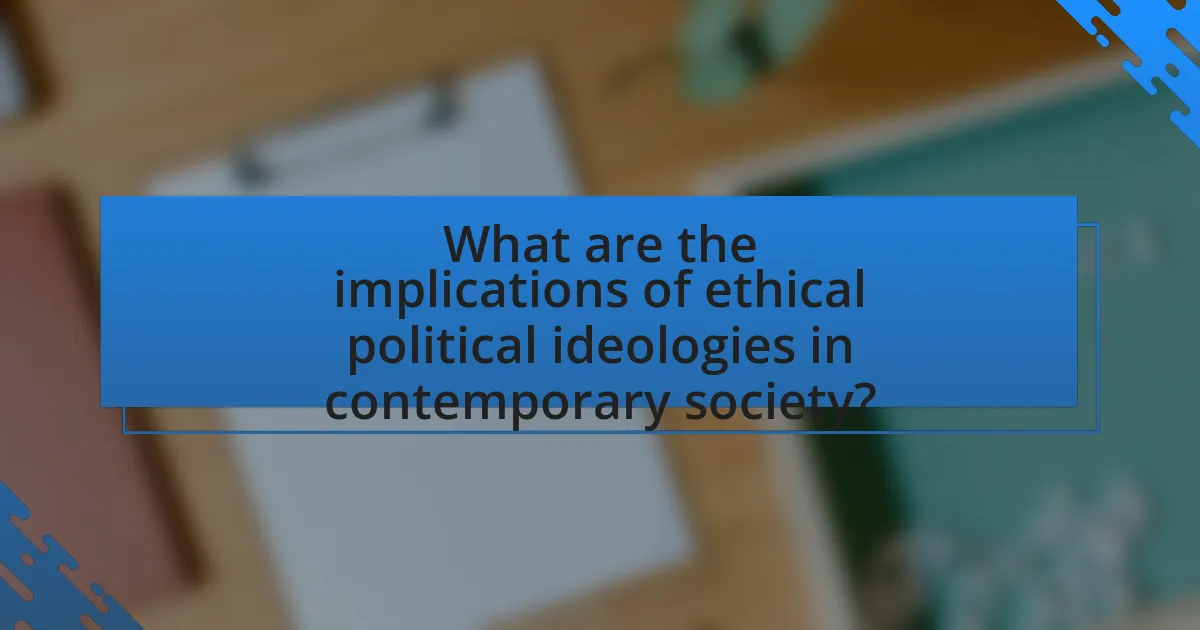
What are the implications of ethical political ideologies in contemporary society?
Ethical political ideologies significantly influence contemporary society by shaping public policy, social norms, and individual behavior. These ideologies, such as utilitarianism, deontology, and virtue ethics, provide frameworks for evaluating moral actions and guiding political decisions. For instance, utilitarianism promotes policies that aim for the greatest good for the greatest number, impacting healthcare and welfare systems. Deontological ethics emphasizes duty and rights, influencing legal frameworks and human rights discussions. Furthermore, virtue ethics encourages civic responsibility and community engagement, fostering social cohesion. The implications of these ideologies are evident in movements advocating for social justice, environmental sustainability, and economic equity, reflecting a collective moral consciousness that drives societal change.
How do ethical considerations influence public policy today?
Ethical considerations significantly influence public policy today by shaping the values and principles that guide decision-making processes. Policymakers often incorporate ethical frameworks, such as utilitarianism or deontological ethics, to evaluate the potential impacts of legislation on society. For instance, the implementation of policies related to healthcare access reflects ethical commitments to equity and justice, as seen in the Affordable Care Act, which aimed to reduce disparities in healthcare access among different populations. This demonstrates that ethical considerations are not merely theoretical but are actively integrated into the formulation and evaluation of public policies, ensuring that they align with societal values and moral responsibilities.
What examples illustrate the impact of ethics on legislation?
Examples illustrating the impact of ethics on legislation include the abolition of slavery and the establishment of civil rights laws. The abolition of slavery in the 19th century was driven by ethical arguments against the inhumanity of slavery, leading to the passage of the Thirteenth Amendment in the United States in 1865, which abolished slavery. Similarly, the civil rights movement in the 1960s emphasized ethical principles of equality and justice, resulting in landmark legislation such as the Civil Rights Act of 1964, which prohibited discrimination based on race, color, religion, sex, or national origin. These examples demonstrate how ethical considerations can shape and transform legislative frameworks to promote social justice and human rights.
How do ethical ideologies shape social movements?
Ethical ideologies significantly shape social movements by providing the foundational beliefs and values that motivate collective action. For instance, movements rooted in utilitarian ethics prioritize the greatest good for the greatest number, influencing their goals and strategies, such as in the case of public health campaigns advocating for universal healthcare. Additionally, deontological ethics, which emphasize duty and rights, drive movements like civil rights, where the focus is on inherent human rights and justice, as seen in the American Civil Rights Movement of the 1960s. These ethical frameworks not only guide the objectives of social movements but also affect their methods, alliances, and public perceptions, ultimately determining their effectiveness and longevity.
What challenges arise when applying ethical theories to political ideologies?
Applying ethical theories to political ideologies presents challenges such as the inherent conflict between universal moral principles and the specific, often subjective, values of political systems. For instance, utilitarianism, which advocates for the greatest good for the greatest number, may clash with individual rights emphasized in deontological ethics, leading to ethical dilemmas in policy-making. Additionally, political ideologies often prioritize power dynamics and social structures over ethical considerations, complicating the integration of ethical frameworks. Historical examples, such as the ethical debates surrounding utilitarianism in welfare policies, illustrate how differing ethical perspectives can lead to conflicting political outcomes, highlighting the complexity of aligning ethical theories with political ideologies.
How can conflicting ethical views complicate governance?
Conflicting ethical views can complicate governance by creating divisions among stakeholders, leading to gridlock in decision-making processes. When different groups prioritize varying ethical principles, such as individual rights versus collective welfare, it becomes challenging to reach consensus on policies. For instance, debates over issues like healthcare reform often reveal stark contrasts in ethical beliefs, resulting in legislative stalemates. Historical examples, such as the U.S. Congress’s inability to pass comprehensive immigration reform, illustrate how divergent ethical perspectives can hinder effective governance and policy implementation.
What strategies can be employed to reconcile differing ethical perspectives?
To reconcile differing ethical perspectives, one effective strategy is to engage in open dialogue that emphasizes active listening and mutual respect. This approach allows individuals to understand the underlying values and reasoning behind each perspective, fostering empathy and reducing conflict. Research indicates that dialogue-based methods, such as those outlined in the “Dialogue and Deliberation” framework by the National Coalition for Dialogue & Deliberation, can lead to more constructive outcomes by creating a space for shared understanding. Additionally, employing a common ethical framework, such as utilitarianism or virtue ethics, can provide a basis for evaluating differing viewpoints and finding common ground. This method has been supported by studies in moral philosophy, which show that shared ethical principles can facilitate agreement on contentious issues.
What practical steps can individuals take to engage with the ethics of political ideologies?
Individuals can engage with the ethics of political ideologies by critically analyzing their own beliefs and the beliefs of others. This involves researching various political ideologies, understanding their ethical implications, and reflecting on how these ideologies align with personal values. Engaging in discussions, attending lectures, and participating in community forums can further enhance understanding. For instance, studies show that exposure to diverse viewpoints fosters critical thinking and ethical reasoning, as highlighted in the research by the American Psychological Association, which emphasizes the importance of dialogue in ethical engagement.
How can citizens critically evaluate political ideologies?
Citizens can critically evaluate political ideologies by analyzing their foundational principles, historical contexts, and real-world implications. This involves examining the core beliefs and values that underpin each ideology, such as liberty, equality, and justice, and assessing how these concepts manifest in practice. For instance, citizens can study the outcomes of policies derived from different ideologies, such as socialism or liberalism, by reviewing historical case studies like the economic reforms in post-war Sweden or the civil rights movements in the United States. Additionally, engaging in discussions, reading diverse perspectives, and utilizing critical thinking skills allows citizens to identify biases and assumptions within ideologies. This methodical approach enables a more informed and nuanced understanding of political ideologies and their ethical implications.
What role does education play in understanding political ethics?
Education plays a crucial role in understanding political ethics by providing individuals with the knowledge and critical thinking skills necessary to analyze ethical dilemmas within political contexts. Through formal education, students learn about various political theories, ethical frameworks, and historical case studies that illustrate the complexities of political decision-making. For instance, courses in political philosophy often cover the works of thinkers like John Rawls and Hannah Arendt, enabling students to grasp concepts such as justice, power, and moral responsibility. This foundational knowledge equips individuals to engage thoughtfully in political discourse and evaluate the ethical implications of policies and actions, thereby fostering informed citizenship and ethical leadership.



